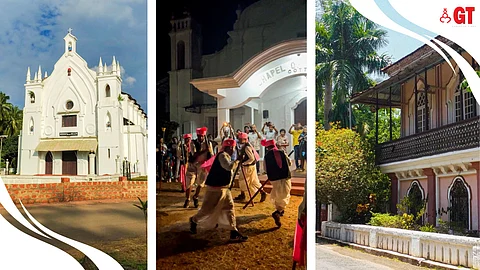

In his budget speech last year, Chief Minister Pramod Sawant had proposed to develop Chandor as a heritage village in a bid to showcase Goa’s rich history.
Taking the first step in giving Chandor heritage village status, an expression of interest has been sought to appoint a consultant to prepare a master plan for the village.
It will suggest means to preserve the tangible and intangible heritage, besides plans for a heritage circuit, beautification, developing streetscapes, museums and more.
There is absolutely no denying that in the hoary corridors of Goa’s rich past, Chandor is steeped in history. It’s been the former capital of the Bhoj dynasty and that of the Kadamba kings, transcending not just dynasties, but also centuries.
There surely, however, would be much more in Chandor and that can only be unearthed through a far more detailed archaeological survey and much research even before it is promoted as a heritage village.
It brings along with it some tangible elements of heritage and well as intangible.
The Nandi Bull that was excavated, and remains on display, is a 13th century stone image, and the unique dance – Mussol Khell – that is performed only here on the second day of Carnival dates back centuries too, to the Kadamba period.
There are also stories and legends that have been passed down through generations, recounted also in books on the village, and some beliefs that today may not be as fervent as before.
There surely, however, would be much more in Chandor and that can only be unearthed through a far more detailed archaeological survey and much research even before it is promoted as a heritage village, or perhaps, simultaneously, too.
There do exist archaeological remnants, which include the site of Shiva temple remains, where the headless Nandi Bull is preserved.
Then, there exist remains of an ancient fortification wall, that in the past was not given the preservation and conservation attention it merited, and so, fell into disuse with little awareness of the historic importance of the wall.
Old Goa, a World Heritage Site that has been awaiting the implementation of a heritage policy for decades.
But, that apart, what exists today in Chandor, the visible portions, would be only the heritage houses and religious structures, which though old, are of more recent vintage, than the Nandi Bull and the wall.
Would that be enough of historical evidence to give the village the heritage status the government aims for? Another question would be what can Chandor and its residents expect from a heritage village?
Let’s look therefore at Old Goa, a World Heritage Site that has been awaiting the implementation of a heritage policy for decades. The complex of churches – seven churches in active use or otherwise including one in ruins – has been designated as a World Heritage Site by UNESCO, and the monuments are being maintained by ASI.
One can debate on the state of conservation, but that is not the point being made here.
Old Goa, the village, has neither been given a heritage status nor its surrounding areas developed to maintain a heritage feel and look.
What is important here is how are the surroundings of this World Heritage site being maintained, protected and preserved so as to give the entire area, and not just that where the monuments are located, an improved look.
Old Goa, the village, has neither been given a heritage status nor its surrounding areas developed to maintain a heritage feel and look.
As late as earlier this month, February 2024, the Save Old Goa Action Committee urged the Chief Minister to prepare a master plan to save the World Heritage Site from encroachments and destruction.
What this committee has been fighting against is illegalities in the area, primarily leading to constructions and proposed projects that do not blend with the heritage site or would have a deteriorating effect on the monuments.